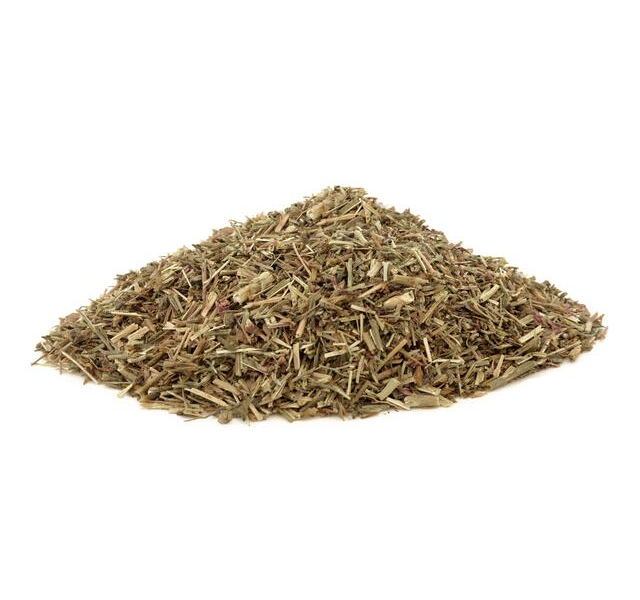Packaging: 30g (or 500g & 1kg) containing Centaury (Erythraea).
(The price includes VAT.)
Other Names: Thermobatano, Red Centaury, Thermochorito, Pharmakoulithra, Pharmakohorto, Pharmakopklia, Kininohorto, Aloe, Votani, Rigohorto, Chiron’s Herb, Wild China, Centaury, Common Centaury, European Centaury.
The plant Centaurium erythraea, commonly known as Centaury, is prevalent in continental Greece and the islands of the Eastern Aegean. It grows in moist, shaded areas, on slopes, in forest clearings, meadows, and along road edges, at elevations from 300 to 2000 meters.
The genus name Centaurium derives from the Greek word “centaur,” referencing the centaur Chiron, who, according to mythology, taught humans about the healing power of herbs. Many consider it to be the "great centaurium" of ancient Greeks.
In folk medicine, it is a well-known and popular herb used for treating fever, hence its common name "thermobatano." It is tonic, anti-rheumatic, and aids in digestion.
It is famed for being a bitter aromatic and tonic for gastrointestinal issues, such as bloating, dyspepsia, and flatulence. It is said to positively affect the liver and kidneys, "cleansing the blood."
It is primarily recommended for cases of anorexia and acts as a calming agent for the nervous system. It pairs well with marshmallow and chamomile. This bitter herb enhances the production of gastric secretions, stimulating appetite and improving digestion.
Traditionally, it has also been used to treat fever, which is why it’s called “fever herb.”
It is an excellent tonic as it stimulates appetite and bile secretion. It is also used for heartburn and sluggish digestion. Additionally, it acts as a cleanser for abdominal gas, is anti-anemic, anti-scorbutic, and very effective for heartburn.
It is particularly valuable for people in recovery and is used for anemia or general weakness.
It is especially effective against stomach pain in individuals with gout. It has mild anti-inflammatory effects and lowers blood sugar and triglyceride levels.
The plant also contains a chemical compound called swertiamarin, which is the main ingredient in the namesake medication used to treat hepatitis. This same compound is used for managing diabetes, reducing blood lipids, and relieving pain.
In homeopathic medicine, erythraea is used to stimulate the production of gastric fluids and appetite.
It is a bitter, hepatic, cholagogue, diaphoretic, digestive, emetic, and anti-scurvy herb. Generally, Centaury:
- Has antipyretic and anti-inflammatory effects.
- Is an excellent tonic, opening the appetite and stimulating bile secretion.
- Is valuable for individuals in recovery and is used for anemia or general weakness.
- Is particularly effective against stomach pain in individuals with gout.
- Stimulates the sympathetic system and circulation, providing a tonic effect on blood circulation.
- Is one of the most potent herbs against diabetes and cholesterol.
- Is useful for colitis and suppressed menstruation.
- Helps with gastrointestinal disorders and enhances stomach function when taken before meals. It is also used for heartburn and sluggish digestion.
It contains bitter glycosides, nicotinic acid, alkaloids, gentianine, gentianidine, and gentioflavone, gentio-picrine, and erythrocentaurine, phenolic acids, and traces of essential oil.
Precautions:
Due to its stimulation of gastric acid secretion, it could theoretically exacerbate conditions such as digestive ulcers, heartburn, and inflammatory bowel disorders.
It is a bitter, tonic, appetizing, and digestive herb. It also cleanses abdominal gas, is anti-anemic, anti-scurvy, and very effective for heartburn. Its bitter action stimulates digestive secretions. It also stimulates the sympathetic system and circulation and has a tonic effect on blood circulation. In Europe, Erythraea is used for anemia and liver and gallbladder diseases. It is a mild laxative and, when taken after meals, is an excellent remedy for heartburn. It is particularly effective against stomach pain in individuals with gout. It has mild anti-inflammatory effects and lowers blood sugar and triglycerides. Like many bitter tonics, it is effective in reducing fever and has been successfully used as a substitute for quinine in the past.
The plant is used as a flavoring in bitter herbal liqueurs and is a key ingredient in vermouth. It contains valeric acid, which contributes to the plant's aroma through its esters.
Origin: Greece. Imathia Region (cultivated)
Storage: Keep in a cool, dark place (5°C – 15°C)
Preparation:
1 tablespoon of crushed Erythraea (or a small pinch of uncrushed) is added to a container with 1 cup of boiling water, left covered for 10-15 minutes, and then strained before use.





